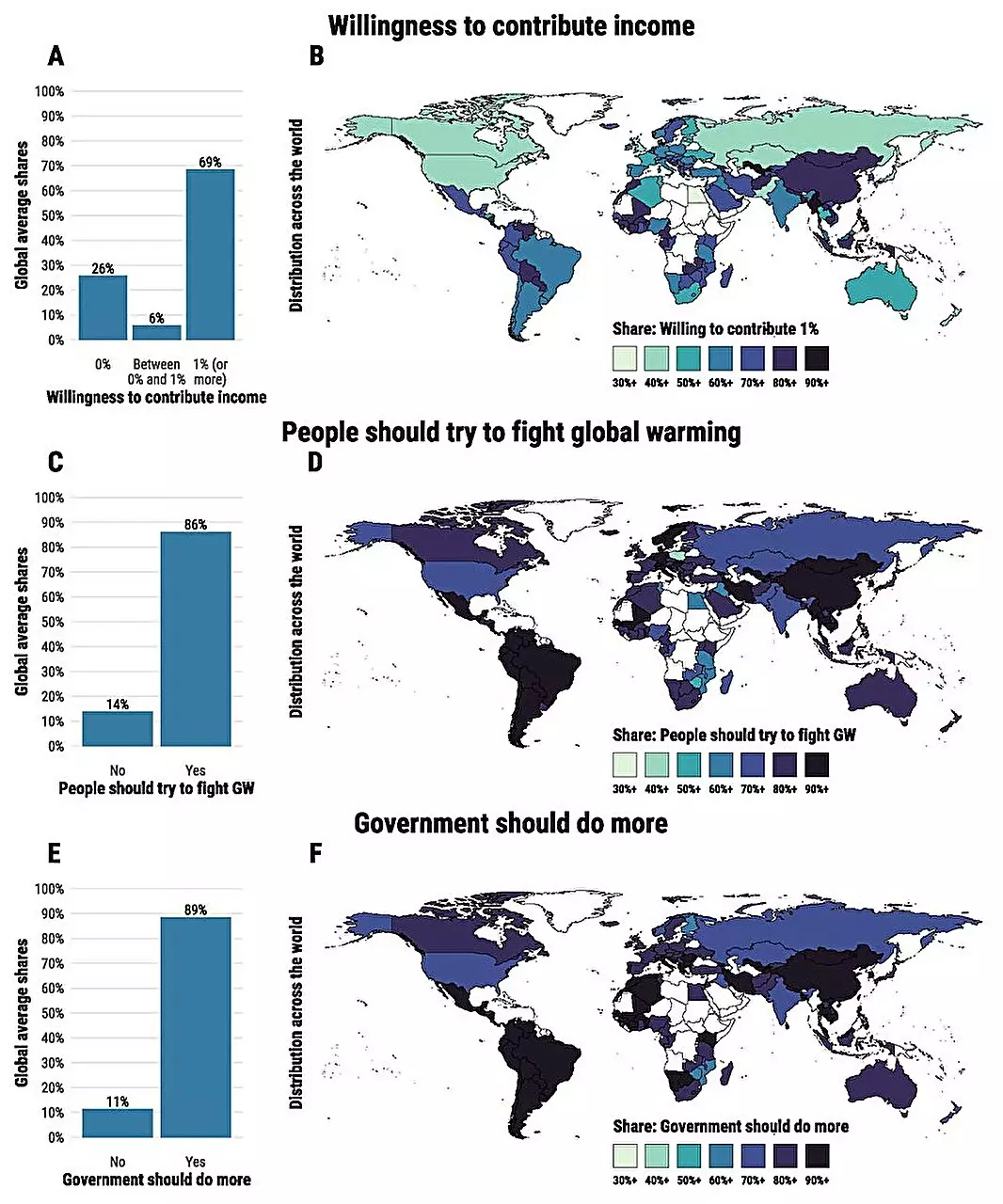A recent study conducted by behavioral researchers at the University of Bonn, the Leibniz Institute for Financial Research SAFE in Frankfurt, and the University of Copenhagen has shed light on an encouraging trend: a majority of the world’s population is not only supportive of climate action but also willing to make personal sacrifices to combat climate change. The study, published in Nature Climate Change, is based on a comprehensive survey that encompassed 125 countries and involved around 130,000 individuals. The findings reveal that a staggering 69% of the global population is open to contributing 1% of their personal income to the fight against climate change, signifying a significant commitment to climate action. Furthermore, an overwhelming 86% of respondents endorse pro-climate social norms, while 89% advocate for increased political action. Notably, countries most affected by global warming exhibit an even higher willingness to combat climate change. Conversely, countries with higher GDP per capita demonstrate a lower propensity to engage in climate action. These results offer a promising outlook on the global commitment to addressing climate change.
Armin Falk, a behavioral economist and professor of economics involved in the study, recognizes the immense significance of these findings. Asserting that the world’s climate is a global public good, Falk emphasizes that climate protection necessitates collective efforts from all corners of the globe. He affirms that the broad majority supporting climate action is both remarkable and uplifting. Peter Andre, an economist at SAFE, adds to this sentiment, stating that almost all countries exhibit widespread approval of pro-climate social norms. The survey results further establish that an overwhelming 86% of respondents believe individuals in their country should actively strive to combat global warming. In addition, a near-universal call resounds for national governments to step up their efforts in combating climate change. The global demand for greater political action on climate change is unequivocal.
An Underestimation of Willingness to Act
Despite the overwhelmingly positive statistics demonstrating the global willingness to combat climate change, the study also identifies a significant disparity. Researchers find that the willingness of citizens to engage in climate action is consistently underestimated in every single country surveyed. Globally, the actual proportion of individuals willing to contribute 1% of their income to climate action (69%) is underestimated by a substantial 26 percentage points. Highlighting the consequences of such systematic misperceptions, Falk explains that those who underestimate public support for climate action are often less inclined to take action themselves. Consequently, this poses a potential obstacle to the successful fight against climate change. However, the study also offers insights into an effective strategy to address this issue and foster increased individual willingness to act.
The research team proposes an alternative approach to counteract the persistence of pessimism and foster a more proactive stance on climate action. Instead of giving voice to a vocal minority opposing any form of climate action, it is crucial to effectively communicate that a vast majority of people worldwide are ready to take action on climate change and anticipate their governments to do the same. By shining a light on the collective will and commitment to combat climate change, a more optimistic narrative can counter discouragement and promote a positive dynamic. Creating an environment of optimism and mobilizing individuals through effective communication plays a key role in encouraging mass participation in climate action.
Methodology and Representativeness
The survey was conducted as part of the 2021/2022 Gallup World Poll and encompassed countries responsible for 96% of global greenhouse gas emissions, 96% of global GDP, and 92% of the world’s population. To ensure representativeness within each country, samples were randomly selected from the resident population aged 15 years and older. Interviews were conducted either by telephone (in high-income countries) or in person (in low-income countries). With approximately 1,000 respondents in most country samples and a total of 129,902 individuals surveyed, the study ensures comparability across countries and cultures through professional translation and extensive testing.
The study’s findings demonstrate an unprecedented global consensus on climate action. The majority of the world’s population is not only willing to contribute personally but also supports the adoption of pro-climate social norms and increased political action. Nonetheless, it is vital to address the persistent underestimation of society’s willingness to act, as it can impede progress in the fight against climate change. By effectively communicating the overwhelming support for climate action, optimism can prevail, fostering a positive dynamic that mobilizes individuals worldwide. The study paves the way for a brighter future in which collective efforts can bring about meaningful change in the face of climate crisis.



Leave a Reply